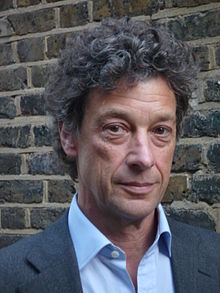Adam Zamoyski
Adam Zamoyski | |
|---|---|
 | |
| Born | Adam Stefan Zamoyski 11 January 1949 New York City, United States |
| Occupation(s) | Historian, author |
| Spouse |
Emma Sergeant (m. 2001) |
| Parents |
|
| Family | Zamoyski |
Adam Zamoyski (born 11 January 1949) is a British historian and author descended from the historically important Polish nobility.[1]
Personal life
[edit]Born in New York City in 1949, as Adam Stefan Zamoyski, the youngest son of Count Stefan Zamoyski (1904–1976), member of the Zamoyski family and his wife, Princess Elizabeth Czartoryska (1905–1989), who left their homeland when it was invaded by Germany and the Soviet Union in 1939. When the Soviets took power at the end of World War II, they found themselves stranded in the West, eventually settling in London.[2]
Zamoyski has dual Polish-British nationality. He was brought up in England and educated at St Philip's Preparatory School, The Queen's College, Oxford, where he read History and Modern Languages (BA Hons. 1970, MA Hons 1974).
Zamoyski lives in London with his wife, the painter Emma Sergeant (b. 1959), daughter of Sir Patrick John Rushton Sergeant.[citation needed] He first visited Poland in the 1960s and now has a second home in an area of great biodiversity near Zamość, where he has planted over a thousand trees and restored a number of traditional wooden cottages.[3]
Career
[edit]Zamoyski is a historian and author, with numerous books including his history of Poland, The Polish Way, and Moscow 1812: Napoleon's Fatal March, his account of Napoleon's invasion of Russia in 1812. His biography of Frédéric Chopin, Chopin. Prince of the Romantics, was serialised as the 'Book of the Week' on BBC Radio 4 in 2012.[4] His books have been translated into more than a dozen languages.[5][2]
Books
[edit]- — (1979). Chopin: A Biography. London: Collins. ISBN 0-00-216089-7.[6]
- — (1980). Chopin: A New Biography (1st USA ed.). Garden City, N.Y.: Doubleday. ISBN 0-385-13597-1.[7]
- — (2010). Chopin: Prince of the Romantics (revised ed.). London: HarperCollins. ISBN 978-0-00-735182-4.[8]
- — (1981). The Battle for the Marchlands: A History of the 1920 Polish-Soviet War. Boulder: East European Monographs.
- — (1982). Paderewski. A Biography. London: Collins.
- — (1987). The Polish Way: A Thousand-Year History of the Poles and Their Culture. London: John Murray.
- — (1992). The Last King of Poland. London: Jonathan Cape.
- — (1995). The Forgotten Few: The Polish Air Force in the Second World War. London: John Murray.
- — (1999). Holy Madness: Romantics, Patriots and Revolutionaries 1776–1871. London: Weidenfeld & Nicolson.
- — (2001). Poland: A Traveller's Gazetteer. London: John Murray.
- — (2001). The Czartoryski Museum. London: Azimuth Editions.
- — (2004). Moscow 1812: Napoleon's Fatal March on Moscow. New York: HarperCollins.
- — (2007). Rites of Peace: The Fall of Napoleon & the Congress of Vienna. London: HarperCollins. ISBN 9780060775186.
- — (2008). Warsaw 1920: Lenin's Failed Conquest of Europe. London: HarperCollins.
- — (2009). Poland: A History. London: HarperPress.[9]
- — (2014). Phantom Terror: The Threat of Revolution and the Repression of Liberty 1789–1848. London: William Collins.
- — (2018). Napoleon. The Man Behind the Myth. London: William Collins.
- (2024) Izabela the Valiant: The Story of an Indomitable Polish Princess: William Collins
Contributions and other publications
[edit]- Sienkiewicz, Henryk (1990). Charcoal Sketches and Other Tales. Translated by Adam Zamoyski. London: Angel Books. ISBN 978-0-946162-32-1.
- — (2018). Napoleon. All You Need to Know ... London: Connell Publishing. ISBN 978-1-912568-01-7.
See also
[edit]References
[edit]- ^ Gorgas, Angela (1977). "Count Adam Zamoyski (1949–), Historian". National Portrait Gallery, London. Retrieved 28 December 2020.
- ^ a b Stephens, Richard (2018). "Echoes of the Past". Poland Today. Archived from the original on 17 October 2021. Retrieved 28 December 2020.
- ^ "My favourite painting: Adam Zamoyski". Country Life. 29 October 2018. Retrieved 2 October 2021.
- ^ Zamoyski, Adam (2012). "Chopin: Prince of the Romantics". Book of the Week. BBC Radio 4. Retrieved 28 December 2020.
- ^ Europa Publications (2003). "Adam Zamoyski". International Who's Who of Authors and Writers 2004. Psychology Press. ISBN 9781857431797.
- ^ OCLC 5948326
- ^ OCLC 639395617
- ^ OCLC 891811930
- ^ "Poland by Adam Zamoyski: review". The Telegraph. 7 May 2009.
External links
[edit]- 1949 births
- Living people
- Alumni of the Queen's College, Oxford
- English people of Polish descent
- Historians of Polish descent
- Counts of Poland
- Zamoyski family
- People educated at Downside School
- Knights of Malta
- Fellows of the Royal Society of Literature
- American emigrants to England
- Historians of the Napoleonic Wars
- Writers from New York City
- American people of Polish descent
- 20th-century British historians
- Polish male non-fiction writers
- Naturalized citizens of Poland
- Historians of Poland
- Chopin scholars
